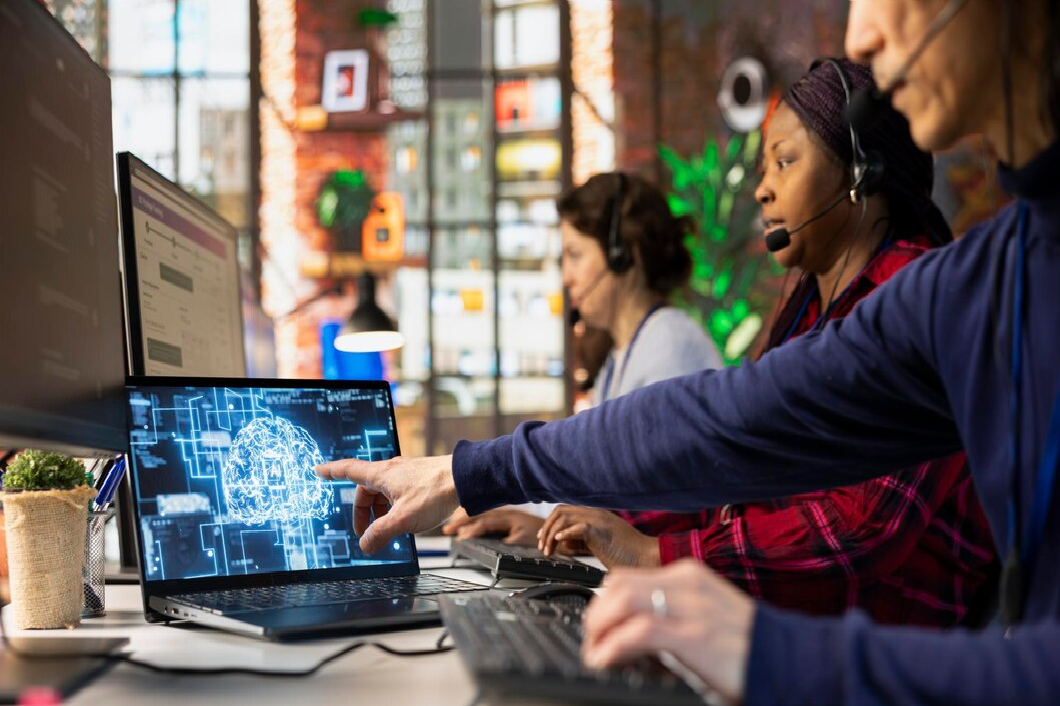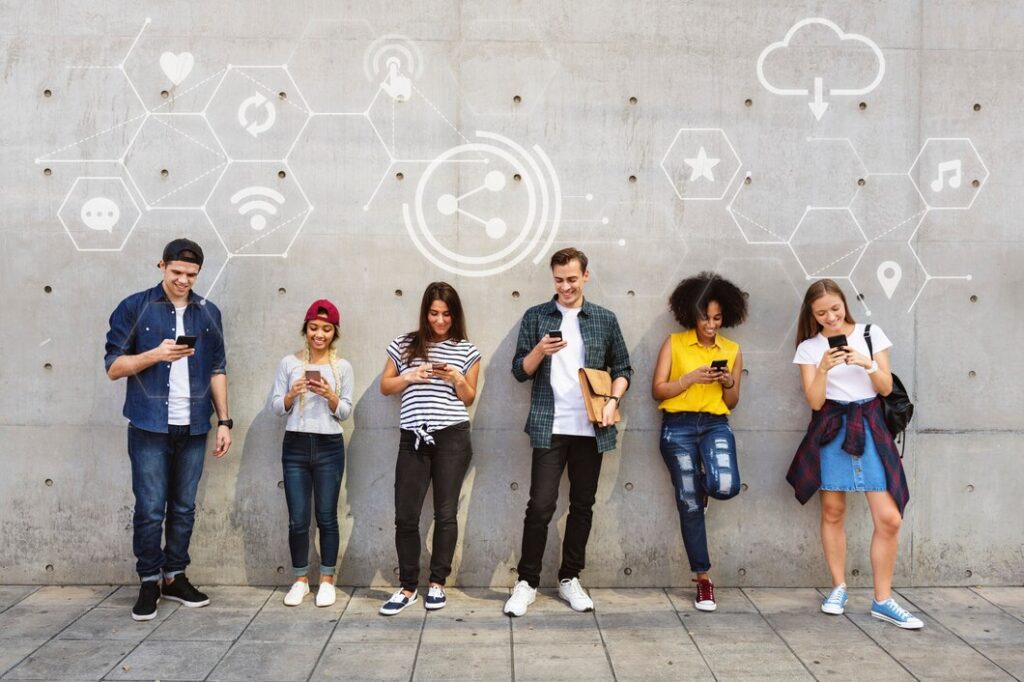
We live in a digital era where our daily existence is fundamentally shaped by smartphones, AI, and online platforms. The influence of modern tech is so vast that it has completely altered how we work, learn, and connect with one another. As this digital transformation accelerates, it’s crucial to understand technology’s effect on society.
From the way we build communities to how we process information, technology acts as both a powerful tool and a significant challenge. This article will explore the profound ways our digital society is evolving, examining the positive and negative impacts and how they are changing our lives, relationships, and collective identity.

1. The Impact of Modern Technology on Daily Life
Modern technology has deeply embedded itself into our routines. Tasks that once took hours can now be completed in minutes, thanks to automation, smartphones, and the internet. Need groceries? There’s an app for that. Want to speak to someone on another continent? Video calls make it instant.
The impact of modern technology is reflected in our increased efficiency, convenience, and connectivity—but it also raises concerns about dependency, screen addiction, and reduced human contact.
From smart homes to self-driving cars, digital tools are reducing physical labor and increasing productivity. But are we sacrificing too much of our cognitive independence in exchange for convenience?
2. Digital Transformation in Society: A Revolution in Real Time
The digital transformation in society is not just about using computers or the internet—it’s about a fundamental shift in how systems, businesses, education, healthcare, and governments operate. Paper records have been replaced by cloud storage. Meetings now happen over Zoom. Learning occurs through online courses and AI tutoring platforms.
This transformation is happening across every sector:
- Education: Virtual classrooms, AI tutors, and e-learning platforms are redefining how knowledge is shared.
- Workforce: Remote work, digital collaboration tools, and AI-driven analytics are the new normal.
- Healthcare: Telemedicine, health tracking apps, and AI diagnostics are revolutionizing patient care.
While these changes make life more efficient, they also introduce new challenges such as data privacy, tech inequality, and the widening digital divide.
3. How Technology Has Changed the Way We Communicate
Perhaps the most significant transformation of the digital era is the fundamental way in which technology has altered how we interact with one another. From handwritten letters to instant messaging, our communication methods have undergone a dramatic transformation.
The New Norms of Communication
- Texting over talking: Short, rapid messages have replaced long conversations.
- Emojis instead of emotions: Visual icons are now a primary tool for expressing feelings.
- Video calls and voice notes: These are replacing physical presence and phone calls.
While this allows for global connectivity, it also leads to misunderstandings due to lack of tone, facial cues, or emotional nuance. The rise of social media has further blurred lines between real and curated communication, affecting how deeply we connect with others.
4. Technology and Mental Health: A Complicated Relationship
The relationship between technology and mental health is complex. On one hand, tech tools offer support—mental health apps, meditation guides, online therapy, and access to information. On the other hand, technology can be a source of stress, anxiety, and depression.
Positive Impacts:
- Digital platforms for therapy have significantly increased the availability of mental health support.
- Mood tracking apps help users monitor their emotional wellbeing.
- Meditation apps promote mindfulness and stress reduction.
Negative Impacts:
- A direct correlation exists between high levels of screen time and impairments in both sleep patterns and the ability to concentrate.
- The act of comparing oneself to others on social media is a significant contributor to feelings of anxiety and diminished self-worth.
- The constant flow of news can contribute to emotional burnout.
As mental health becomes a critical issue globally, understanding how technology affects mental health in modern society is essential. While it offers tools for healing, it can also be a source of emotional exhaustion if used without boundaries.
5. The Pros and Cons of Technology’s Impact on Modern Society
Positive Effects:
- Global connectivity: People across the world can interact and share ideas instantly.
- Educational access: Online platforms make learning more accessible, even in remote areas.
- Medical advancement: Digital records, AI diagnostics, and robotic surgeries improve outcomes.
- Environmental solutions: Smart agriculture, renewable energy tech, and waste reduction tools help fight climate change.
Negative Effects:
- Digital addiction: Excessive reliance on screens leads to mental and physical health issues.
- Privacy concerns: Data breaches and surveillance are growing threats.
- Job displacement: Automation and AI may eliminate certain types of jobs.
- Reduced human interaction: Face-to-face social skills may erode over time.
Acknowledging the positive and negative effects of technology on society helps us use it more mindfully. We must strike a balance between leveraging innovation and protecting our humanity.
6. How Technology Affects Mental Health in Modern Society
While many embrace tech advancements, few pause to consider how technology affects mental health in modern society. The always-on culture, driven by smartphones and social media, has made it difficult to unplug. Constant alerts, comparisons, and digital noise can trigger:
- Dopamine loops from likes and comments, leading to compulsive behavior
- Information overload, resulting in anxiety or analysis paralysis
- Social withdrawal, as users replace in-person connections with screen time
Youth are especially vulnerable, with rising cases of anxiety and depression linked to social media usage. While tech can enhance mental wellness through support tools, excessive or unregulated use can harm psychological resilience.
7. How Technology Affects Relationships and Communities
Our relationships—whether familial, romantic, or social—are all being reshaped by technology. Understanding how technology affects relationships and communities reveals both empowering and concerning trends.
Relationships:
- Romantic: Dating apps have changed how people meet, creating more options but also promoting superficiality.
- Friendships: Group chats and social media keep friends connected, yet often lack emotional depth.
- Family: While video calls help long-distance families stay in touch, too much screen time during family gatherings can create disconnection even when together.
Communities:
- Online tribes: People can now find niche communities that share their interests or struggles.
- Activism and outreach: Technology has enabled grassroots movements to scale globally.
- Isolation: However, these online communities may sometimes replace real-world interaction, weakening the bonds of physical neighborhoods and local support systems.
As we navigate digital life, the goal should be to use tech as a bridge—not a barrier—to authentic connection.
8. Technology and Cognitive Shifts: Thinking in the Digital Age
Technology doesn’t just change how we live—it changes how we think. In a digital society, the way we process information, make decisions, and retain knowledge is evolving rapidly.
Shifting Brain Functions
- Memory: With information constantly accessible online, we rely less on memory and more on search.
- Attention: Scrolling culture has reduced our attention spans and made multitasking the norm.
- Critical Thinking: The rise of fake news and algorithmic feeds challenges our ability to evaluate sources and think independently.
While access to knowledge is broader than ever, the way we internalize that knowledge is increasingly fragmented. In some ways, we are outsourcing our brains to machines.
9. The Future: Building a Conscious Digital Society
The question isn’t whether technology is good or bad—it’s about how we use it. The future of a healthy digital society depends on intentional usage, ethical innovation, and ongoing education.
What We Can Do:
- Promote digital literacy: Teach children and adults to critically evaluate online content.
- Encourage digital detoxes: Regular breaks from screens help reset mental clarity.
- Design with empathy: Developers should consider mental health and societal impact in their designs.
- Build inclusive tech: Ensure that digital transformation benefits all sectors of society, not just the privileged.
Our digital tools are here to stay. The challenge—and opportunity—is to shape them into forces for good.
Conclusion
In conclusion, the impact of modern technology is vast and deeply intertwined with every facet of our lives. As digital transformation in society continues, it’s crucial to examine how technology changes the way we live, think, and feel. From how technology has changed the way we communicate to the positive and negative effects of technology on society, we are witnessing both breakthroughs and breakdowns in human connection.
While technology brings us closer in some ways, it can also isolate us emotionally and mentally. The relationship between technology and mental health, as well as how technology affects mental health in modern society, must be taken seriously. Likewise, understanding how technology affects relationships and communities will help us nurture authentic human bonds in an increasingly digital world.
Ultimately, the goal is not to reject technology but to use it with wisdom, compassion, and intention—so that we don’t lose sight of what makes us truly human.





